Elvis (2022): Movie Review & Ending, Explained & Synopsis.
August 16 marks the 45th anniversary of Elvis Presley’s death. Involuntarily, watching the movie “Elvis” of the 2022 model predicted this date.
In 1979, a similar film with Kurt Russell was already released. It was filmed for a ridiculous $2 million even for its time, but it turned out to be surprisingly solid. Las Vegas was still the same as under Presley, all his acquaintances and companions were alive, so the film was shot in an authentic setting and under the close supervision of accomplices.
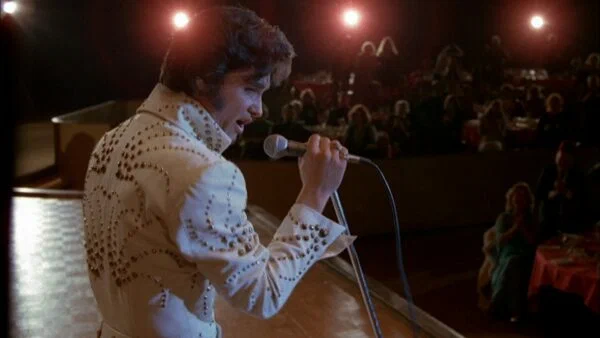
Kurt Russell as Elvis
45 years later, things are no longer the same. Koresh died out, of the relatives only the ex-wife and daughter remained. The latter own all the rights to the work and image of Elvis Presley, which allows them to tightly control – as they talk about the life of the ex-husband and father.
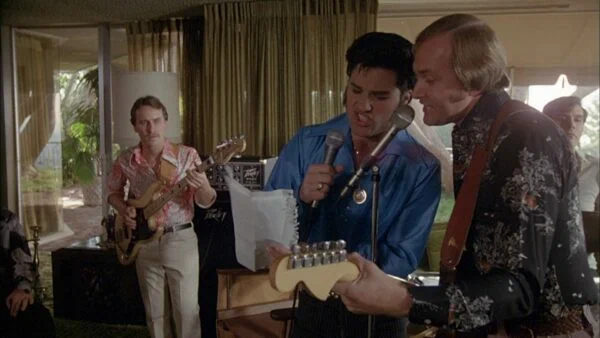
Still Kurt Russell
And his life was very peculiar. He worked insanely hard, until he was completely exhausted, and then sat at home in the company of a dozen men and girls who rotated regularly. It was possible to go out into the street only at night, because during the daytime the girls constantly threw themselves on the neck. A lot at once. It sounds pretty tempting, but walking around with girls around your neck is rather uncomfortable, and they also tear your clothes. To buzz at night and sleep during the day, Elvis threw all sorts of substances. What this led to, everyone knows.
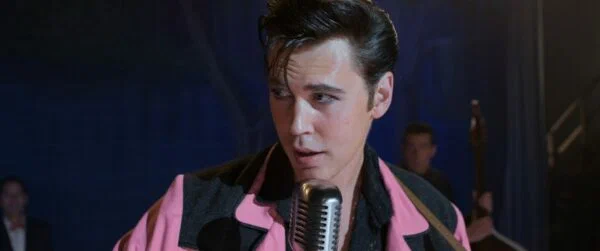
Austin Butler as Elvis
And yet, apparently, outside of creativity, Elvis was terribly boring. Many female stars who tried to hook up with him quickly jumped off. It seems like a god is on the stage, and outside it is an ordinary rural boy with whom there is nothing to fuck about. Polite, attentive, kind, but… boring. Yes, and with cockroaches in my head, the number of which, under the influence of substances, was growing rapidly. Next to Elvis, young fools and hangers-on lingered, pulling money and gifts from him.
And it turns out a paradox. On the one hand, there is a great artist who left a lot of films, concert recordings and wonderful songs. On the other hand, there is nothing interesting outside of creativity. Despite the insane popularity, he only visited Germany and France in his entire life, and even then while serving in the army. And then he sat in the States until his death. Memphis, Vegas, concerts in North American ebony – in general, that’s all. Sitting, playing ball, riding a motorcycle at night, eating pills.
There were a lot of girls, yes. It’s interesting about this. But Priscilla Presley, remember, is in control of the script. Therefore, in both films about himself, Elvis appears almost like a monk. Yes, something happened to him there a little bit in terms of hookup, but in general – flint. After the divorce, Elvis had at least two permanent partners (he lived with one for 4 years), but they are not in the film. Loved Priscilla until my last breath, yes. Couldn’t eat. Only pills and ate.
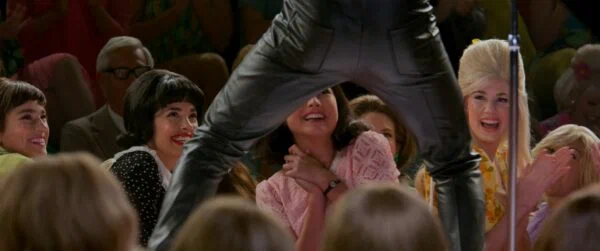
An actor who can convey the incredible charm of Elvis is impossible to find. Austin Butler, who plays the title role, is trying very hard. He managed to almost flawlessly copy the plastic movements of the original. Looks impressive from a distance. Unfortunately, the facial expressions turned out to be beyond the power of the actor. And the masculinity of his face could not be given by any make-up.
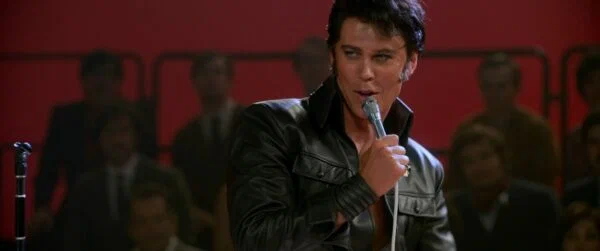
There are no fools in Hollywood, and therefore the role of Elvis’ manager, Colonel Parker, is extremely strengthened in the film. Say, it was he, the greedy bastard, who ruined the genius. Tom Hanks plays the greedy villain just fine. But in reality, of course, the Colonel was not such a sinister figure. Yes, he took hard for the services, but he also won impressive contracts. Elvis was fine with just about everything. He, as far as one can judge, was terribly fed up with all this singing. For the last five years, he, in fact, sang the same concert. And new records were squeezed out of it by a teaspoon. Genius remained genius. But he was sick of all this life, and he could not come up with another one for himself, and he was afraid. And the environment continued to suck bablishko. After all, even in the last gloomy years, Elvis remained incredibly generous and generous.

In general, the impression of the film is ambiguous. The scenes are well staged. But most of them can be watched and listened to in the original. It’s even better there, despite the sharp increase in editing skill in the 21st century.
The biography was distorted and huge pieces were thrown out of it. Everything that can be softened. Elvis is not the same. Priscilla, as always, puffy hare, eyes pop-pop, tears like drip.
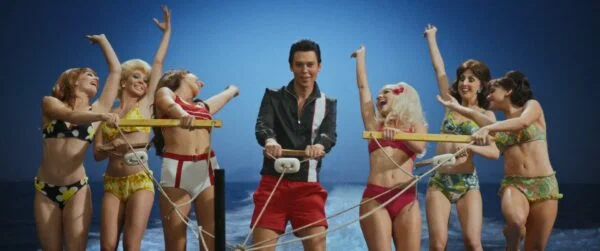
As for me, it turned out to be a well-made shit in a bright wrapper. I definitely won’t watch it the second time, and the first one, in general, was not worth it.
PS Although no, I’m lying. I really liked how it was shown – where Elvis got inspiration for the movements and manner of singing. Black artists – unnamed and portraying real people – are shown in a classy way.
Baz Luhrmann’s “Elvis” does what the new “Top Gun” does – returns to the days when cinema waseasier. Not a movie, but two and a half hours of great music and bright clips from the director of Moulin Rouge.
“Elvis” from Baz Luhrmann is very easy to scold. You can even say that with a detailed analysis of the film, it will not be possible not to scold him, because the plot of the picture is simply chaotic.
The director tried to fit in two and a half hours the entire busy life of the artist, and even polished it with references to social topics: the era of McCarthyism, segregation, the assassinations of Kennedy and Martin Luther King Jr.
Moreover, sometimes you can get almost an epileptic seizure from editing: split-screen was added to the crazy gluing in the style of Bohemian Rhapsody, and even non-linearity.

For all this, the film can be criticized. It’s just that you don’t want to do that. After all, it was Baz Luhrmann who returned, and it is strange to expect something else from him. It was he who once came up with a completely kitsch adaptation of Romeo and Juliet with Leonardo DiCaprio, where the characters called their pistols swords.
He mixed times, genres and styles in the Moulin Rouge, making the inhabitants of the 19th century French theater sing Smells Like Teen Spirit. He also shot The Great Gatsby with colorful costumes, electro swing and dubstep.
So, could Luhrmann suddenly produce a consistent biopic about the famous singer in the style of the same “Bohemian Rhapsody”? That’s hardly.

Therefore, it is worth preparing in advance that Elvis is not an attempt to tell about the life of a singer, but another musical that Luhrmann could well have filmed 20 years ago, when there were an order of magnitude less expectations from musical films.
The only surprise of the plot is that the main character is not Elvis (he is played by a very charismatic Austin Butler, not too similar to the prototype). No, the movie is about him. But the story is told by a much more interesting character – Colonel Tom Parker (Tom Hanks in a very unexpected way).
He is both the main driving force of the plot and the villain – a kind of Mephistopheles, who offers the young star a contract for his soul (that is, for sincere creativity) in exchange for popularity.

Alas, even with this hero, the fuse is only enough for half the picture. At first, he really looks ambiguous, combining prudence and care. But then he turns into a very operetta villain.
However, without an emphasis on Parker, Elvis would have lost half of its charm, turning into a banal story of the formation of a star and a heavy share of the idol of millions.
But really, why talk about all this? After all, Luhrmann simply gives out what is expected of him: two and a half hours of musical numbers and magnificent costumes.
The director’s wife, four-time Oscar winner Katherine Martin, was responsible for the last component, who also created outfits for his previous works.
So expect a wave of Elvis fashion parties, like the Moulin Rouge and The Great Gatsby.
But still, the main advantage is the music. Luhrmann called in the film composer Elliott Wheeler, with whom they worked on the extremely underrated TV series Anneal. It was he who turned the Elvis soundtrack from a set of well-known songs into a crazy mixture of styles, and sometimes within the same composition.
Some tracks were re-recorded with vocals by Austin Butler, others retained the original voice of Elvis, but the entire instrumental was changed in the ’68 Comeback Special TV scene. But the main thing is not even that. Luhrmann once again put together a soundtrack of mashups bordering on vulgarity.
This is when the song of the king of rock and roll turns into rap from Eminem, or the famous Hound Dog begins to sing Big Mama Thornton, and after the first lines Doja Cat joins her.

There is even a composition mixed from several different Elvis songs. And fashionable Måneskin. And Jack White’s guitar. And the duo of Stevie Nicks and Chris Isaak. And a remix of a Presley song by Tame Impala. And further. And further. And more … Just some kind of paradise for a music lover.
At the same time, the structure follows the classic musicals. The characters get their “themes”: Elvis’s relationship with his mother – Heartbreak Hotel, his communication with the colonel – Are You Lonesome Tonight, and so on. Only in this case, these “themes” are not written for the characters, but are taken from the classics. Just like in the Moulin Rouge.
The video here simply complements the music. When it comes to re-recorded real performances of the singer, everything is filmed with almost documentary accuracy, right down to the costumes of extras in the ’68 Comeback Special.
If these are fictional scenes, then Luhrmann again takes up his favorite grotesque: he twists the brightness of the picture and the expression of each character to the maximum.
And as a result, the film leaves a very unusual impression. You can and even want to scold him for the confusion. But if you throw out all the plot components from the picture in general and leave it just a musical, where the whole life is presented only through Elvis songs and unusual mixes … it won’t get any worse.
You can just watch cool clips for more than two hours and imagine that now is the beginning of the 2000s: the covers of famous tracks in the cinema are not yet tired, every second one does not criticize films for the fact that “characters cannot be sympathized with”.
Oddly enough, these feelings are very close to the reaction to the new “Top Gun”, the plot of which does not stand up to criticism, but no one discusses it. After all, there are tough guys flying planes and defeating villains. Or silly adventures in The Lost City, which is too much like Romancing the Stone.
All these films pretend that the last 20-30 years simply did not exist: the approach to filming and even the choice of topics in the cinema has not changed. It is enough just to make a bright and driving spectacle so that the viewer looks at a beautiful picture for two hours. And in this case, I also listened to music. No more. Okay.
Love. Passion. Music
“In order to achieve great things, great sacrifices must be made.
(From the movie “Elvis”)
1940s After moving from the poor areas of Mississippi to Memphis, the little boy Elvis Presley spends almost all his free time on the street. Gradually, he becomes interested in local African American music. Elvis does not yet know that in the future this addiction will make him an icon of rock and roll.
The introduction of “Elvis” is reminiscent of the opening shots of Orson Welles’ “Citizen Kane” . This fact alone perfectly characterizes the film of Baz Luhrmann , a director who specializes in lush musicals and melodramatic productions with a special emphasis on the visual component. The Elvis Presley Picture is a pretentious, voluminous work about one of the most significant figures in the history of popular music.
During his thirty-year career, Luhrmann made only six feature films. Each of them is distinguished by a recognizable style: a picture polished to a shine, a feeling of an endless holiday, albeit often with a sad and sad intonation, non-linear narration, the presence of super-general plans, the use of a split screen, hypertrophied theatricalization of what is happening, a special reverent attitude to props, costumes, scenery and graphic design of the film and, of course, an abundance of spectacular dance and musical numbers.
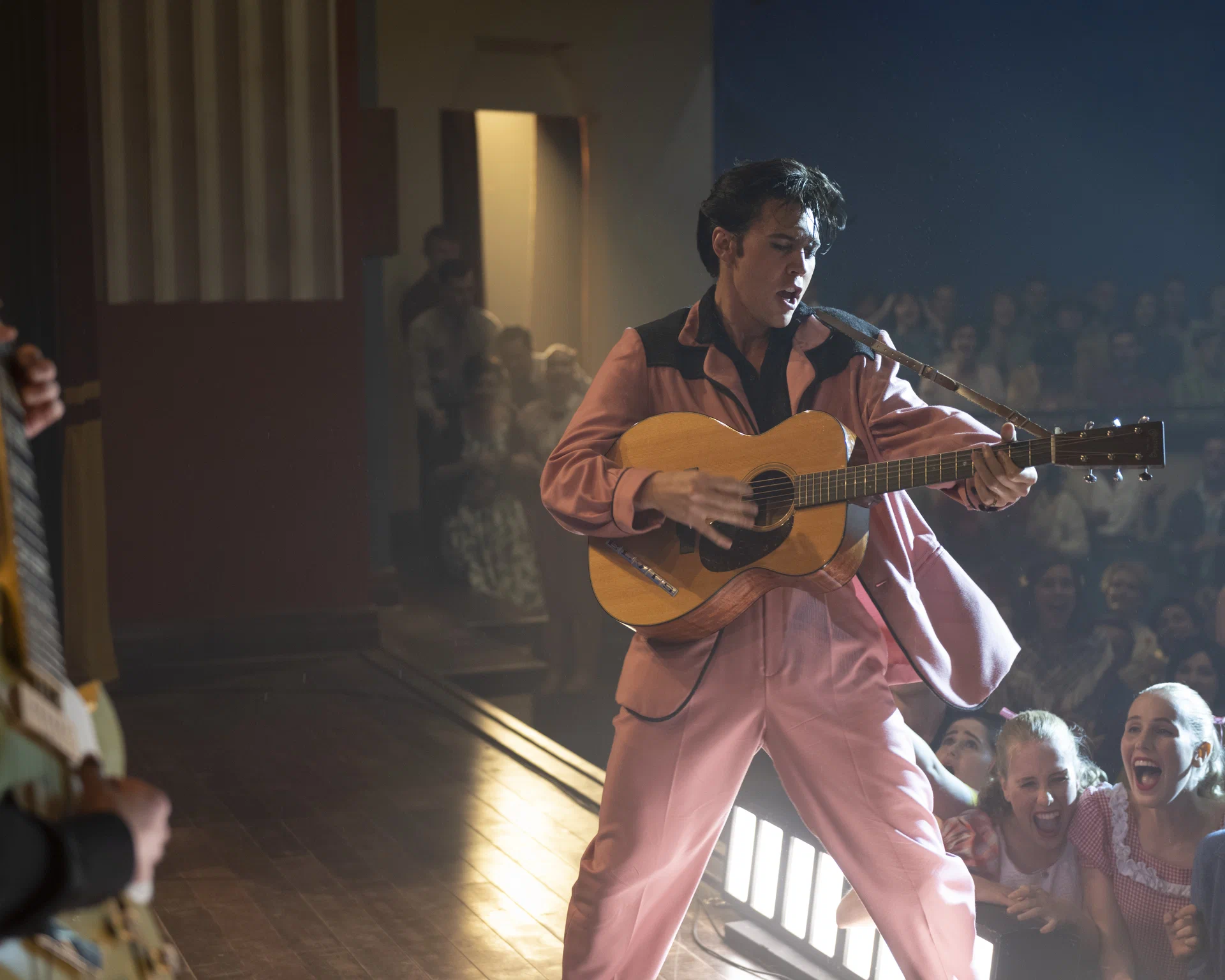
All this fully applies to “Elvis” – the story of a performer who combined country and blues in his work, who became the founder of a new musical style – rockabilly, who again popularized live performances and left behind a rich cultural heritage.
Luhrmann took on the ambitious and extremely difficult task of recording all the major turns in Elvis Presley’s career and life: a difficult but happy childhood in Mississippi, the young years of the future singer in Memphis, where in the quarters of Beale Street he became acquainted with Negro music and wholeheartedly into it fell in love, affectionate relationship with mother, first steps in professional music, cooperation with promoter Tom Parker, acting in films, resounding success after the release of the song “Heartbreak Hotel”, military service, confronting prejudice about promoting “black music” among white youth, short-lived happiness with his wife Priscilla and dependence on drugs that have become drugs for the artist.

The author of “Moulin Rouge” shows the beginning of the artist’s career, when his simple but charming singles gradually won the favor of the public, a hot whirlwind sweeps through Elvis’s life, going along with the singer a difficult path from his formation as a musician and father, from problems with censorship and himself to a flamboyant, profligate, rhinestone-embellished, flamboyant costume, booze, sex, and sold-out concert life.
“He was a real punk on the scene ,” says Baz Luhrmann of Elvis Presley. Indeed, in his production, the director shows how much the singer was obsessed with music and the stage.
The artist has overcome many challenges along the way. With the help of spectacular numbers, the authors (the script of the film was written together with Luhrmann by his faithful associates Craig Pierce and Sam Bromell ) show how the artist circumvents the serious obstacles that arise before him. For example, the song “Trouble” is Presley’s answer to racists from the south who are worried that the singer is setting a bad example for children – due to the predominance of heightened sensuality and “black orientation” in his music. And “If I Can Dream” becomes an ode to willpower and dreams.

Elvis’ relationship with his manager, “Colonel” Tom Parker, mother Gladys ( Helen Thompson ), wife Priscilla ( Olivia DeJong ), music and the stage, and also with himself are given an important place in the tape.
The protagonist is hungry for fame, is very attached to his mother and loves his wife. From this follow the features of his character: Mr. Presley is narcissistic, infantile and romantic.
In turn, Parker turns out to be a slippery type, but only at first glance. The impresario, who at some point replaced the artist’s family, on the one hand, sincerely cared for his ward, and on the other, cared only about himself and his financial obligations.
In part, this is the musician himself. From its merits follow its shortcomings. Lovingness results in cheating on his wife, passion for his work – health troubles, a pathological relationship with his mother – in a co-dependent relationship.

Playing the protagonist little-known to the general public , Austin Butler (TV series CSI: Crime Scene Investigation New York and Arrow, Once Upon a Time in… Hollywood) gives an impressive performance. The actor performed all the songs in the film on his own, and the engagements of his hero, which were more like religious performances (as a child, Elvis sang in the church choir, and one of his early hobbies was gospel, a musical genre of Christian music), cannot but impress – the artist gives all the best in these scenes one hundred and ten percent.
Almost unrecognizable Tom Hanks has tried on the image of a compassionate, but duplicitous “Colonel” Tom Parker. The actor in complex makeup and with a Dutch accent looks older than his years. His character combines dictatorial habits, dry cynicism and parental love, sometimes bordering on paternalistic guardianship. Such duality leaves room for fantasy – to decide whether the viewer will be a bad or a good Parker.
As Elvis’ manager, Hanks looks like a cartoon character. In Luhrmann’s film, the artist is infinitely far from the good-natured losers who brought him fame who got into trouble.

The film’s soundtrack mixes Elvis’ hits with today’s melodies. So, one of the introductory scenes of the picture opens with a performance of the king of rock and roll at the International Hotel in Las Vegas. An overture from Richard Strauss ‘ musical poem “Thus Spoke Zarathustra” sounds, and in the following episodes we hear the songs of the American rapper and singer Doja Cat “Vegas” and “The King and I” by Eminem .
Both tracks were specially written for the tape. Doja Cat contains an interpolation of an excerpt from the Big Mama Thornton song “Hound Dog” (1952), which was then covered by Elvis, and the work of the most famous white rapper in the world samples Presley’s hit “Jailhouse Rock” (1957).
Such an artistic technique only once again emphasizes the timelessness of Presley’s history, his legacy, and also pays tribute to the musician.
The intersection of classics and modernity was typical for the director before. Suffice it to recall The Great Gatsby , the musical accompaniment of which surprised with the presence of Jay-Z, Lana Del Rey, will.i.am, Florence and the Machine, Jack White, Beyoncé and other stars of our time.

Tracing the fate of the singer, Luhrmann also demonstrates what changes have taken place in the life of the United States. On the example of famous performers – bluesman BB King ( Kelvin Harrison Jr. ), gospel star Rosetta Tharpe (Yolanda Quartey ), one of the pioneers of rock and roll Little Richard ( Elton Mason ), rhythm and blues artist Big Mama Thornton ( Shonka Doukure ) – the director paints with sparing strokes the changes in the life of the black population of the country: an increasing respect for African Americans, an ever-increasing level of tolerance, but at the same time, archaic prejudices preserved deep under the skin.
Closer to the finale – grandiose, lush and insanely pathetic – the pace of the film noticeably slows down. The long running time of the tape (159 minutes) turns into its own disadvantage. The lightness and slightly mockingly ironic tone that Luhrmann took at first are replaced by the utmost seriousness by the end.
The biopic turns from a brilliant (in the literal sense of the word), sparkling with rhinestones, blinding bright lights of the stage and unimaginable Presley costumes into a boring, mostly conversational melodrama with numerous digressions, tearful episodes, clichés and stilted characters.

It cannot be said that the protagonist, Parker or other characters previously had an extraordinary depth of character portrayal, but thanks to the extremely spectacular episodes and the emphasis on the formal, stylistic and aesthetic features of the film, the dry study of the characters was not so strongly felt.
Indeed, the singer’s impassioned performances as the camera of Mandy Walker (Australia, Hidden Figures ) shamelessly admired Elvis’s crotch, or the footage of the Ferris wheel roaming the empty arcade of the lost “Colonel” Parker and crazy concert performances changing in a crazy kaleidoscopic whirlwind Presley, set to the hits of the king of rock and roll, distracted from looking at the characters under a microscope.
The final third of the film loses the pace set by the director. From this, the sadly solemn story of Mr. Presley does not become less impressive, but loses a little in colors.

The film has a lot of memorable scenes, great music and great acting. She surprises with the amazing work of the production designers (Lurmann’s wife, his faithful companion Catherine Martin ), vocal intonations and exaggerated sexuality splashing from the screen.
“Elvis” – the author’s look at who Elvis Presley was, a beautiful tale that tells what this great singer did for the world of music and for the world in general, and how his work turned into a soundtrack for the lives of hundreds of thousands and millions of people around the world the world.
Baz Luhrmann’s “Elvis” has finally appeared on digital platforms, and now the masses can calmly (if the word “calmly” is applicable to the films of the Australian director) consider the biopic about the king of rock and roll that has successfully performed in the world in all details and colors. And who is the king of violent colors? That’s right, the same Luhrmann. The circle is closed.
Do we need another Elvis movie? Presley is a natural icon, as the movie poster directly says. But still, even a small child knows about “That’s All Right” for $ 8, a pink Cadillac and the Graceland estate – and all thanks to more than a dozen feature films about Presley, and if you take documentaries, television shows and the singer’s filmography itself, then the list will exceed a hundred.

But do we need another Baz Luhrmann film? Of course, yes! In this dark time, we definitely need on the screen (preferably on a big one, but we understand everything) these trousers, their best female friends and theatricality with an indispensable curtain. By the way, why did Luhrmann once announce that the “trilogy about the red curtain” was completed at the “Moulin Rouge!”? She has not gone anywhere, and we miss this shameful beauty and obscenely defiant chic, brilliance and kitsch.

And what do we see? Circus, Las Vegas, Elvis’s childhood, cards, money, midgets, fire swallowers, morphine, squealing girls, religion, chronicle, roulette, tinted eyelids, Elvis’ heart attack, slot machines, women’s panties, grease, cadillac, big sweat drops, newspaper headlines , the golden curtain… Presley’s whole life flashes in a nightmare of his manager Tom “The Colonel” Parker, known as “the man who killed Elvis”, for… the first 15 minutes of screen time. They have everything: rapid shooting and accelerated editing, cartoons and comics, split-screen and many angles. “That’s All Right (Mama)” plays at least four times and each time in a new arrangement during those miserable first few minutes, during which you don’t even have time to catch your eye on anything and understand what’s going on. But that’s what we wanted!

But then there are almost two and a half hours of retelling and deciphering what we have just seen. And what we already know so well. After this prologue at maximum speed, for the first time we clearly see Elvis performed by Austin Butler, who was taken on the role of a pop icon, it seems, only for similarity. Yes, he moves amazingly, it is easy to identify him with the title character, but it seems that the main character here is the Colonel (Tom Hanks in complex plastic make-up). Not only that, as we have already said, this is a story about how the manager sees his ward, but Parker also comments on what is happening throughout the film behind the scenes. Yes, and his machinations, which, according to some versions, finished off the king of rock and roll, tired of endless concerts, are more interesting to watch than the singer himself (it’s funny to understand that this is the second time, when Tom Hans almost meets Elvis in the movies. For the first time – this is a little Forrest Gump). The Colonel constantly transforms in this non-linear narrative, while Elvis throughout the film blows his lips, feigning resentment, stomps his foot when he doesn’t like something, wrinkles his forehead severely when he decides to rebel against the system.

The film is dedicated to the rebellion that is relevant today (and perhaps this is the only difference between Luhrmann’s picture and the rest of Elvis’ biographies). There were two problems in America in the 50s: segregation and sex. The first prevented a white person from singing like black people and performing rhythm and blues in country clubs. The second forbade “wobble” on the stage so that the girls went crazy. As a result, an experienced and cunning producer who took on the young man decided to “comb” the rebel, put on a tailcoat and forbid him to twirl his hips on stage. Otherwise, the McCarthy-minded secret services could imprison the young man, and then there would be only one way out – the army, which, according to Parker’s plan, would make a man out of Elvis. How it ended, we all know.

Upon his return from Germany, Elvis faced a new problem. While he was successfully recording new records and making films, Beatlemania attacked America in the 60s, against which the singer’s acting and musical activities began to decline. And while Parker was thinking about how to get Presley back on TV, the performer himself again staged a rebellious revolution, reinventing himself, his repertoire, and the scale of the show – and his triumphant return to pop music through a series of concerts in Vegas became Parker’s most insidious trick. Here Luhrmann turns off the voiceover of Tom Hanks, and “subtitles” begin to speak for him in the form of clauses of contracts written on napkins. The style of narration is also changing: there is more static, the editing step ceases to ripple in the eyes.

We know that the Australian visionary director is incredible in his way of blending reality and fantasy into the frame. Only Luhrmann shoots blacks so beautifully (we were convinced of this even on his recent project “The Get Down”). Only he can beautifully fit Britney Spears and the Backstreet Boys into the soundtrack of the 50-70s, while avoiding vulgarity (for example, not putting on the obvious Junkie XL remix of “A Little Less Conversation”), but having time to screw in almost the film’s 100th version of “That’s All Right (Mama)” rap piece.
And Luhrmann knows how to stage dramas in such a way that even healthy men can’t stand it and shed a tear. But for some reason, Elvis does not feel sorry for anyone, but this is clearly not due to the fact that this is the director’s debut in the biopic genre. There is simply no one to feel sorry for. Neither the main character (an element of the popularity of the singer’s biography affects), nor his manager (why feel sorry for a swindler? Especially such an unpleasant outwardly), nor Elvis’s mother (a drunken mother – grief in the family). There is no need for a love line either. Robert Kennedy on TV, Martin Luther King in the chronicle, Sharon Tate in the newspapers are more touching than other heroes. The more ambitious the security measures taken around Presley seem against this background, and, accordingly, the famous phrase “Elvis left the building” finally acquires volume and depth.







